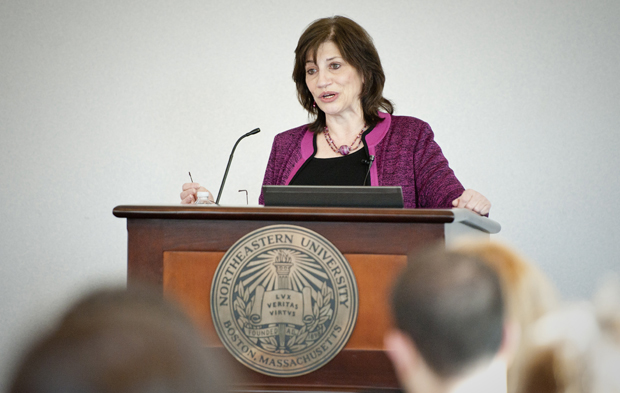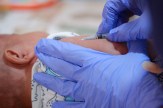Bringing science to society

The National Academies’ Institute of Medicine (IOM) strives to turn the evidence-based recommendations of its members into policy solutions for national problems, such as childhood obesity and healthcare coverage for preventive services. “It’s all about impact,” said Judith Salerno, the institute’s Leonard D. Schaeffer Executive Officer.
“I have two huge bookcases full of wonderful, beautiful IOM reports with lovely covers and great artwork,” she added. “But that’s not what the IOM is about. It’s about getting those books off the shelves and getting them into policy.”
Salerno addressed more than 200 students, faculty, staff and members of the community on Monday morning at the inaugural lecture in the Bouvé Dean’s Seminar Series held in the Raytheon Amphitheater at Northeastern University.
The Dean’s Seminar Series will continue today with a lecture by Jo Ivey Boufford, of the New York Academy of Medicine. The lecture — titled “Is America’s Health Care Policy Healthy?” — will begin at 9:30 a.m. in the Raytheon Amphitheater.
The IOM, which exists outside of government, is a non-partisan, independent, and evidence-based consortium that offers science-backed advice to policy makers. It is made up of 1,600 elected members at the top of their respective fields.
Terry Fulmer, dean of the Bouvé College of Health Sciences and an IOM member, welcomed students to the lecture. “You are the future of the IOM and we know that,” she told them.
The IOM also aims to inform both patient groups and the general public on health issues through readily accessible info-graphics and widgets. For her part, Salerno’s goal at the institute is to “put into practice different ways to have an impact.”
She showed-off a “thermometer” calibrated in degrees of impact that displayed examples of the IOM’s successes. At the bottom of the thermometer lies the not-so-simple task of spreading the message about health-care issues that don’t get a lot of national attention, such as the impact of poor dental care on overall health.
Salerno said the most effective projects are those that cause change, such as the IOM’s recommendations on preventive women’s health, which were adopted into the Affordable Care Act within two weeks of the report’s release.
Being unaffiliated with political and business groups, she noted, allows the IOM to address the health-care needs of vulnerable populations that others are not willing to touch, such as the lesbian and gay community and children struggling to control their weight.
Over the last 10 years, the IOM has issued a suite of studies that have changed the message behind childhood obesity, Salerno said. “The obesity epidemic in this country is more than an issue of personal will,” she explained. “It is about the environments that we put our children and ourselves in or the lack of environments that support healthy eating and physical activity for our families.”





